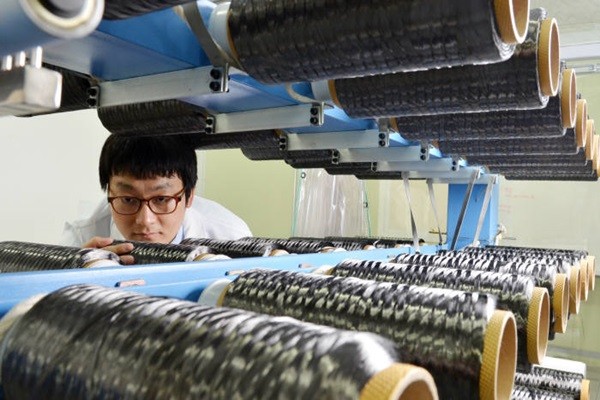Carbon fiber is seen as a ‘dream material’ that can change the paradigm of various industries as it can replace steel due to its characteristics of being light but strong at the same time. It is one of few materials that South Korean companies are highly dependent on Japanese companies. Hyosung became the first South Korean company to start the production of carbon fibers in 2013 and succeeded in localizing carbon fiber.
It is expected that the foundation for home production of carbon fibers will be strengthened even more as Hyosung stated that it would invest $828 million (1 trillion KRW) until 2028 to have a carbon fiber production plant that can produce 24,000 tons of carbon fibers annually which will make it the biggest carbon fiber plant in the world.
South Korean industries expect that South Korea’s competitive edge in carbon fiber will grow within high-performance carbon fiber market that is being led by Japanese companies as South Korean Government is planning to support development of highly elastic carbon fiber.
“It is difficult to say for certain how much carbon material can change the paradigm of industries and there are endless possibilities within back-end industries that use carbon fiber.” said Chairman Cho Hyeon-joon of Hyosung at a new investment agreement ceremony that was held at Hyosung Advanced Materials’ Jeonju plant. “We are going to make Jeonju the Mecca of the carbon industry by having many companies form a cluster for carbon materials and create new products and markets by exhibiting their creative thinking and be one of the foundations in helping South Korea become one of the powerhouses in materials industry.”
Carbon fiber is a type of fiber that has carbon concentration of 92%. Depending on how it is produced, it can be based on PAN (Polyacrylonitrile) or PITCH. While it is 25% lighter than steel, it is 10 times stronger than steel, up to 5 times more elastic than steel, and up to 6 times more thermally conductive than aluminum. As a result, it can be used in various industries such as car, sports, shipbuilding, and aerospace.

It is especially seen as an important material for ‘hydrogen economy generation’ as it can be used as a material for hydrogen fuel tank that needs to withstand pressure that is hundreds of times stronger than air. While fuel tank of Hyundai Motor Company’s NEXO, which is the world’s first fuel cell electric vehicle to be produced, is manufactured by a medium-sized South Korean company called ILJIN Composites, carbon fiber that goes into ILJIN Composites’ fuel tank is supplied by Toray. “We expect that we will be able to supply our carbon fiber soon by collaborating with South Korean companies and testing the quality of our carbon fiber.” said Hyosung.
Toray, Mitsubishi Rayon, and Toho currently supply 66% of carbon fibers in the world. Solvay from the U.S. and SGL from Germany also own parts of the carbon fiber market. Currently, Hyosung is the only South Korean company to produce PAN-based carbon fiber. Hyosung’s carbon fiber corresponds to Toray’s T700 standard (tensile strength: 4.9GPa, elasticity: 230GPa). This is one of the reasons why South Korean Government needs to provide necessary support so that high-quality carbon fibers that have T1000 standard (elasticity over 340GPa) can be developed.
Ministry of Trade, Industry and Energy (MOTIE) is planning to provide support for development of highly elastic PAN-based carbon fiber through an industry-university-research institute consortium centered on Hyosung. Because PAN-based carbon fiber generally has excellent tensile strength, industries expect that South Korea’s competitive edge in carbon fiber technology will be able to take a leap if South Korea secures technology to manufacture highly elastic PAN-based carbon fiber through government support.
“Carbon material field requires long-term training, investments on R&D, and concerns on support for projects as it is difficult to see results in a short period of time and to secure fundamental technologies and knowhow that are level to that of the U.S. and Japan that have invested more than 40 years into this field.” said Professor Jeon Young-pyo of Korea Research Institute of Chemical Technology. “While earning credibility in our carbon fiber from other global companies through Hyosung and other relevant industries, composite material manufacturers must actively expand application of PAN-based carbon fiber.”
Staff Reporter Jung, Hyeonjung | iam@etnews.com & Staff Reporter Ryu, Taewoong | bigheroryu@etnews.com